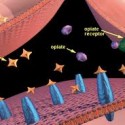Seizure drug shows promise as potential therapy for alcoholism
A new study conducted on mice has shown that a seizure drug, called gabapentin, could act as a potential therapy for alcoholism by reversing cellular effects.
In the study, alcohol-dependent rodents receiving gabapentin drank less alcohol, and this led the scientists to say that gabapentin normalizes the action of certain brain cells altered by chronic alcohol abuse in an area of the brain known as the central amygdala, which plays an important role in fear- and stress-related behaviours, as well as in regulating alcohol drinking.
“The results are exciting. Our research shows that gabapentin not only changes the alcohol-consumption patterns of addicted rats (and not of the control group), but also may reverse some of the effects of addiction on a specific neurotransmitter in the brain,” said Scripps Research Assistant Professor Marisa Roberto, Ph.D., who was first author of the study.
“This is an example of the strength of the translational approach of the Pearson Center, where the clinical uses of gabapentin led us to hypothesize that gabapentin may act to restore homeostatic dysregulation of the GABAergic system. Cellular and behavioral studies converged to suggest that indeed gabapentin could normalize GABAergic tone in a specific brain region known to be dysregulated in dependent animals. Such results provide a strong rationale for translating these observations back to the clinical setting for the treatment of alcoholism,” said George Koob, Ph.D., a member of the research team.
Earlier, gabapentin was shown to effectively treat alcohol withdrawal and reduce alcohol consumption and cravings following detoxification in alcoholics, but the mechanism was unclear.
In the new study, researchers have detailed the action of gabapentin (known commercially as Neurontin)-a structural analogue of the inhibitory synaptic transmitter gamma aminobutyric acid (GABA)-on neural signalling in the brain.
The scientists first tested the effects of gabapentin on the behaviour of alcohol-dependent and non-dependent rats and found that alcohol-dependent rats that received gabapentin drank significantly less alcohol and demonstrated less anxiety-like behaviour in the face of alcohol abstinence than those who did not receive the drug. However, the behaviour of non-dependent rats receiving gabapentin remained unaffected. The results were same when the rats received gabapentin systemically and when the medication was infused directly into the central amygdala region of the brain.
At the cellular level, dependence on alcohol is linked to increased strength of inhibitory synapses (junctions between two nerve cells) in the central amygdala. And now the researchers have found that gabapentin, like alcohol, increased the strength of these central amygdala inhibitory synapse cells from non-dependent rats, but decreased their strength in cells from alcohol-dependent rats.
However, in the presence of a specific inhibitor of so-called GABAB receptors, these effects of gabapentin disappeared, which suggested that gabapentin’s cellular mechanisms likely involve changes in release of the transmitter GABA at the inhibitory synapses.
Also, they found that the sensitivity of GABAB receptors decreased with alcohol dependence, suggesting a biological mechanism for the development of alcohol dependence in general and for gabapentin’s contrasting effects before and after long-term alcohol exposure in particular.
Now, the scientists are planning to further explore the mechanism of action of gabapentin in the brain.
The study is published in the latest edition of The Journal of Neuroscience.
_________
source: Asian News International

